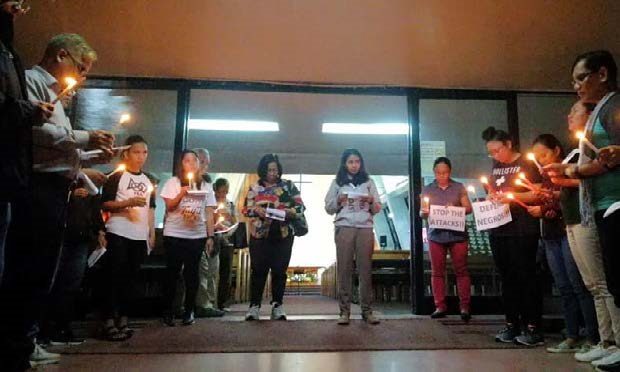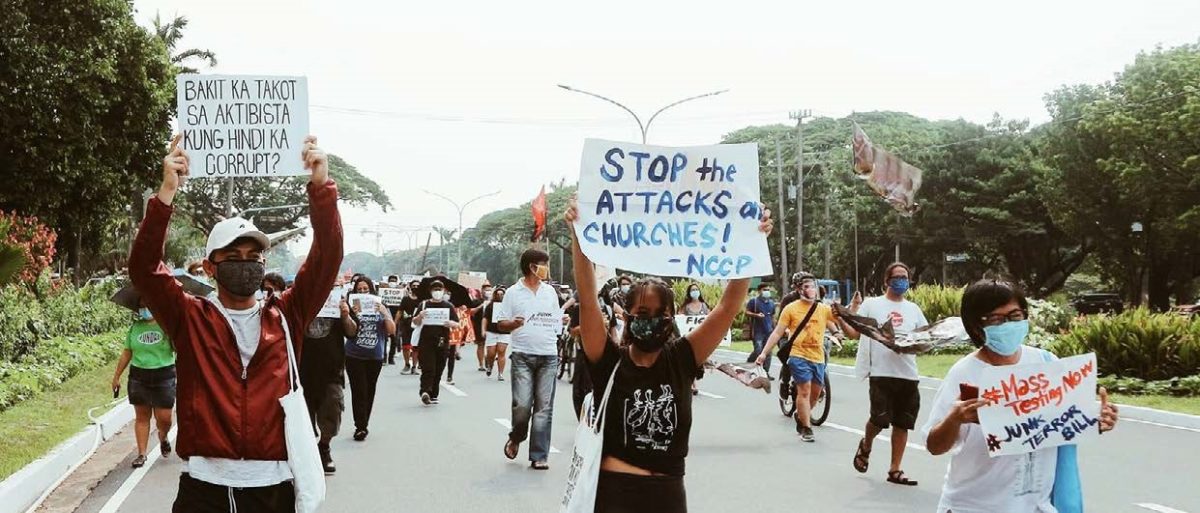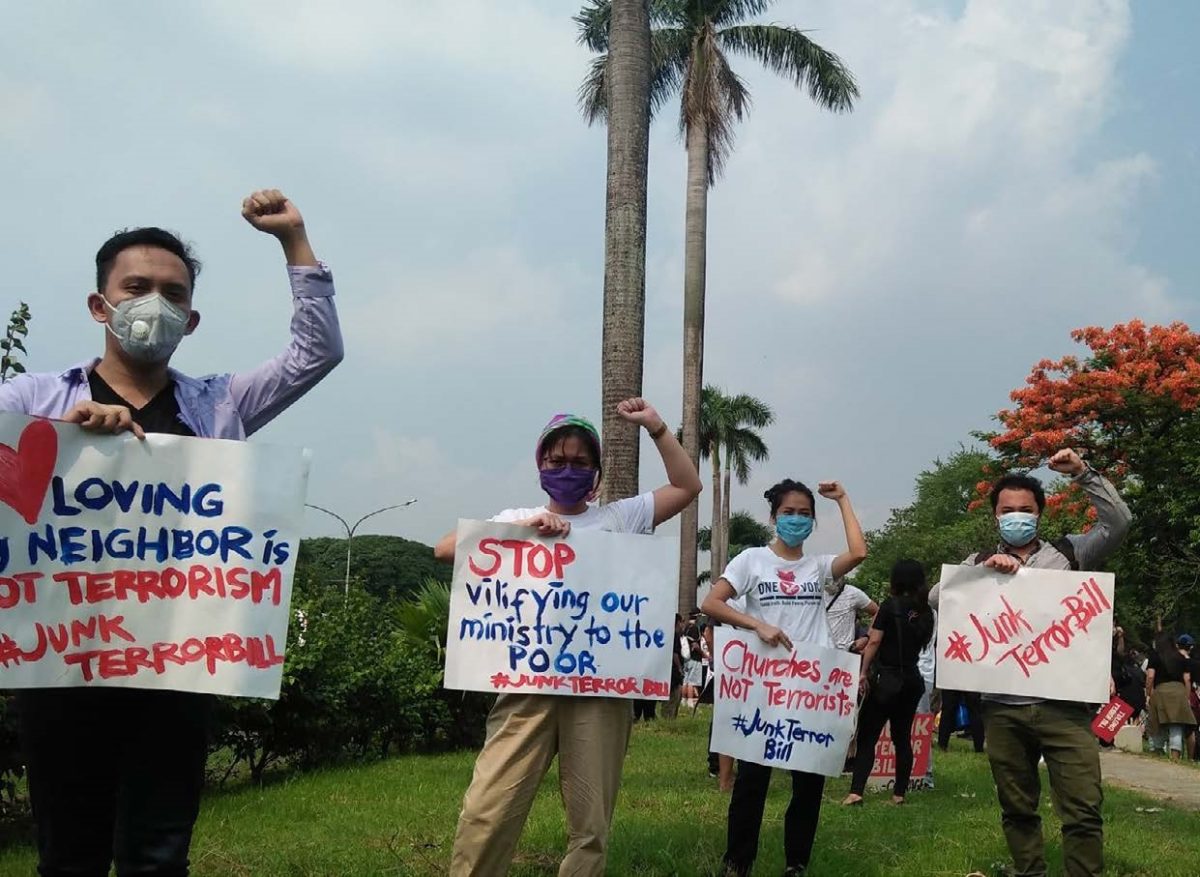By Andrew Humphries
Melbourne Uniting Church minister Berlin Guerrero knows exactly what it means to put your life on the line for your beliefs.
In 2007, the then United Church of Christ in the Philippines pastor was abducted, tortured and imprisoned on a false murder charge for over a year because of his strong social justice advocacy.
And while he is now safer more than 6000km away as a minister at Dandenong Uniting Church, Berlin continues the fight against human rights abuses in his country.
It’s a fight that Uniting Church senior social justice advocate Mark Zirnsak is also waging and he wants Victorian and Tasmanian Synod members to join him.
Human rights abuses have been a stain on the Philippines for many years, with the 2006 Uniting Church report Getting Away With Murder detailing numerous examples.
Fourteen years later, Mark and his team have published another report, They Cannot Kill Our Faith, which documents deaths, assaults and harassment of church workers and members in the Philippines since 2017 as President Rodrigo Duterte tackles a so-called war on drugs.
Among those targeted have been members of the United Church of Christ in the Philippines, which has a strong connection with the Uniting Church in Australia, as well as the Roman Catholic Church, Iglesia Filipino Independiente Church and the National Council of Churches in the Philippines.
Yet, as the report points out, despite the war on drugs being used as an excuse, many of those Filipinos targeted are from impoverished backgrounds and have no connection at all with illicit drugs or the drug trade.
Worsening the situation is the fact that President Duterte has made public comments encouraging members of the police and military to engage in human rights abuses.
“Under President Duterte the situation has escalated and there has been a dramatic increase in the murders of people engaged in social justice work,” Mark says.
“While some of the death threats against church people are because they have criticised the war on drugs, Duterte doesn’t directly link the deaths of social justice advocates to that.
“What he has created, though, is an environment in which we have seen vested interests target those involved in social justice work.”
Berlin’s 2007 experience gives him a unique insight into what confronts those prepared to speak out about human rights abuses in his homeland.

“I was a pastor in a local congregation at that time and very active in human rights advocacy in the Philippines,” he recalls.
“(I campaigned on) economic and environmental issues and issues around the treatment of farmers, workers and the poor, as well as students.
“Because of this longstanding record of advocacy, they suspected me of being connected with the underground communist movement.
“I was abducted and tortured and a murder case was filed against me, but it was baseless and we fought it in court and won and, after one year, three months and 15 days, I was freed from jail.”
While he no longer fears for his safety, Berlin is still subject to harassment because of his advocacy, with recent Facebook posts targeting him and accusing him of being a communist sympathiser.
He has reported those Facebook posts to police.
Berlin says recent anti-terror legislation enacted by the Duterte administration has given the green light to ongoing harassment of people like him critical of its government’s record on human rights.
Known as red-tagging, this harassment involves being “tagged” on social media as either a communist or terrorist or, in some cases, both.
“Anyone critical of the government can now be classed as a terrorist and that becomes an invitation for state forces to attack you, jail you or kill you,” Berlin says.
“There are a lot of people being red-tagged already, including me on Facebook, and I have been accused of being a member of the communist party in the Philippines.”
Mark says the strong stance taken by Berlin is being replicated on a daily basis by social justice warriors in the Philippines determined to make human rights abuses a footnote in the country’s history.
What last month’s report does, he says, is shine a light on a dark corner of the country’s soul.
“The situation is far worse than in 2006 when we published the Getting Away With Murder report because we didn’t see the sort of mass killings then that we are seeing today,” Mark says.
“There is a deep sorrow around what is going on there.
“What is very distressing is that there are people who are advocating to make society better, address injustices and defend and protect those who are most vulnerable and it’s those advocates who end up being targeted.
“That holds the country back and has a deterrent effect on those who might want to speak up and address injustices in the Philippines.”

Leading that fight for justice on the ground in the Philippines and putting themselves at great personal risk are church leaders like Reverend Irma Balaba.
Irma has been harassed for the past three years, with those responsible sometimes attending church services and, as recently as early November, she was alerted to the fact that two unidentified women were stalking her.
In July this year Irma was red-tagged and accused on social media of being a member of the New People’s Army, the armed wing of the country’s communist party.
Irma knows this red-tagging has put her in grave danger.
“Having been red-tagged as a member of the New People’s Army in the midst of the implementation of the anti-terrorism law, I am afraid that the spreading of this malicious posting of my picture with the false information may put my life at risk,” she says.
“This has caused me so much stress and sleepless nights because of anxiety.
“I feel disturbed and filled with apprehension as this malicious act endangers my safety and security.”
Jonalyn Estrella is someone who knows the threat of death is all-too real. She lost her husband, UCCP Pastor Ernesto Javier Estrella, in 2019, gunned down by motorcycle assassins in Antipas, Cotabato.
Ernesto’s “crime” was to speak out publicly against human rights abuses in the country.
Within days of Ernesto’s murder, Jonalyn and their five children, aged 8-18, were harassed and she believes she is still being monitored by those responsible for his death.
“God is with us in our fight, not just for (our family), but for all,” she says.
“It is hard, but I hope the church will continue to support (the fight for social justice). I hope that this violence ends and justice is served to all victims and to all who have been oppressed.”
It is difficult not to overstate what Berlin, Irma and Jonalyn have given to the cause of peace and justice in their country, but they say they have no choice but to continue protesting about the situation there.
“I think any concerned Filipino should and just because I am in another country doesn’t mean I stop doing whatever I can to help,” Berlin says.
“Apart from the church, I am involved with other Filipino organisations that advocate for freedom and democracy and the protection of human rights.
“(I must act because) the people being killed in this war on drugs are just ordinary people and it has become a war against the poor rather than drug dealers.”
Irma turns to the Bible for strength and it guides her in the fight for justice.

“Proverbs 31: 8-9 (NIV) tell us that ‘we must speak up for those who cannot speak for themselves, for the rights of all who are destitute. Speak up and judge fairly; defend the rights of the poor and needy’,” Irma says.
“Peace and human rights are intertwined and peace is the direct result when human issues are properly addressed.
“Therefore, we must share the mandate to protect, promote and enhance what is known politically as ‘human rights’.”
Ultimately, says Mark, it’s people like Berlin and Irma, who are prepared to wear the heavy cost involved in speaking out, who deserve our support.
“It’s amazing to think these are people who are willing to literally put their lives on the line,” Mark says.
“They know that by speaking out they are putting themselves at risk and I do greatly admire their bravery and courage.”
“My own faith is inspired by these people in the church in the Philippines who are risking their own lives for the sake of vulnerable people and communities in danger.”
Mark knows from experience that a grassroots campaign, led by congregation members, can send a strong message to the highest levels of government in Australia and the Philippines that these human rights abuses must stop.
“The experience of 2006 tells us that grassroots protests really can work,” Mark says.
“In 2006, members of the church were willing to take this issue up through writing letters to the respective governments and that is one of the most effective ways to get the message across.
“A grassroots campaign means our government will respond to what they see as something that concerns Australian people and it doesn’t take that many people to say, ‘look, we’re really concerned about this’, for the relevant minister and Department of Foreign Affairs to give the issue consideration.”
Mark’s request of Uniting Church members in Australia is simple and direct and it’s easy to carry out.
Grab a pen and paper and write to the Philippines ambassador Hellen Barber De La Vega expressing your concern about the treatment of those defending human rights in the Philippines and let her know that its government must send a clear message that the murder, harassment and intimidation of these people is unacceptable.
Don’t stop there, though, also write to our Minister for Foreign Affairs, Senator Marise Payne, outlining your concerns about the situation in the Philippines.
Every letter sent, says Berlin, has the potential to effect real change and, despite all that he has witnessed, he is optimistic a better future lies ahead for his country.
“I can definitely see this situation ending and the Duterte government stopping its attacks on the people,” Berlin says.
“The best change would be in government, with Duterte replaced by a more progressive leader.
“But yes, of course, I remain hopeful of improvement and my hope rests on the Filipino people, who are determined, organised and united in the struggle for genuine freedom, democracy and justice.
“No amount of lies or red-tagging can defeat the principles that are being put forward by the people.”
Fourteen long years after the church’s first report on the Philippines, Mark also remains hopeful that pressure from the international community can bring about change.
“We may not be able to stop every death but every life saved is a life worth saving,” he says.
But the final word belongs to Irma, who risks her own life in the fight against oppression in her country and believes, with God’s help, the battle will one day be won.
“Yes, I believe absolutely that change will come,” she says.
“There are threats and harassment but I firmly believe that justice and peace will reign in the end and that the death-dealing ways of today’s empire do not have the final say.”
For more information, call (03) 9340 8807 or contact Mark Zirnsak at [email protected]
HOW YOU CAN HELP
Go to www.justact.org.au/international-peace/reports

